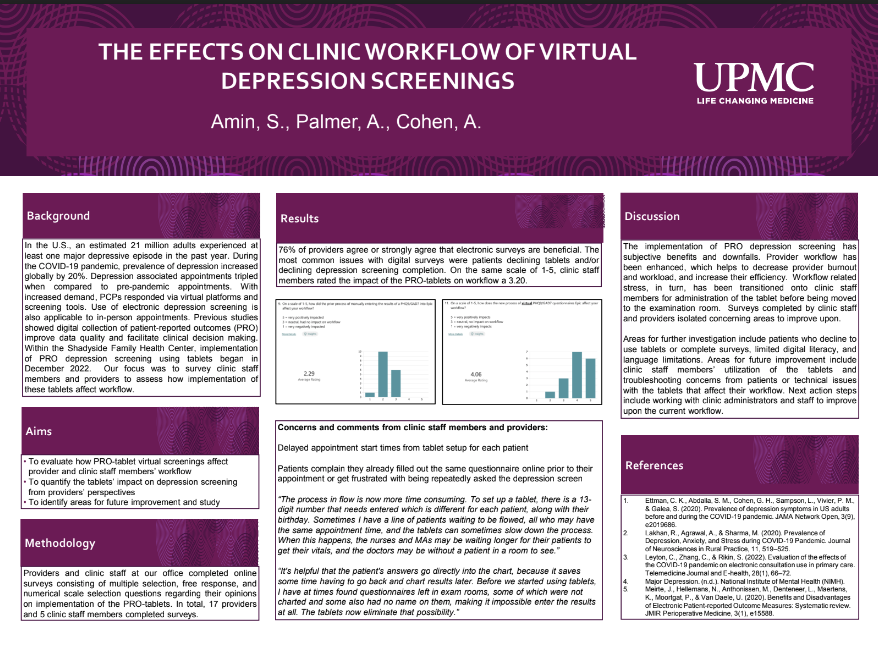Fellow, UPMC Magee-Women’s Hospital Family Medicine Obstetrics Program, Pittsburgh, Pennsylvania
The Effects on Clinic Workflow of Virtual Depression Screenings
Authors:
Samta Amin, MD, MA; Abigail Palmer, DO, MS MEd; Alissa Cohen, DO, MS,DipABLM
Needs and Objectives:
In the U.S., an estimated 21 million adults experienced at least one major depressive episode in the past year. During the COVID-19 pandemic, prevalence of depression increased globally by20%. Depression associated appointments tripled when compared to pre-pandemic appointments. With increased demand, PCPs responded via virtual platforms and screening tools. Use of electronic depression screening is also applicable to in-person appointments. Previous studies showed digital collection of patient-reported outcomes (PRO) improve data quality and facilitates clinical decision making. Within the Shadyside Family Health Center, implementation of PRO depression screening using tablets began in December 2022. Our focus was to survey clinic staff members and providers to assess how implementation of these tablets affect workflow.
Methods:
Providers and clinic staff at our office completed online surveys consisting of multiple selection, free response, and numerical scale selection questions regarding their opinions on implementation of the PRO-tablets. In total, 17 providers and 5 clinic staff members completed surveys.
Results:
On a scale of 1-5 (1 = very negatively impacted, 5 = very positively impacted), providers rated manual depression screenings’ impact on workflow as an average of 2.29, compared to PRO-tablet virtual screenings as a 4.06 rating. 76% of providers agree or strongly agree that electronic surveys are beneficial. The most common issues with digital surveys were patients declining tablets and/or declining depression screening completion. On the same scale of 1-5, clinic staff members rated the impact of the PRO-tablets on workflow as 3.20. The staff’s most common concern was delayed appointment start times from tablet setup for each patient.
Discussion:
In conclusion, the implementation of PRO depression screening has subjective benefits and downfalls. Provider workflow has been enhanced, which helps to decrease provider burnout and workload, and increase their efficiency. Workflow related stress, in turn, has been transitioned onto clinic staff for administration of the tablet before being moved to the examination room. Surveys completed by clinic staff and providers isolated concerning areas to improve upon. Improvement areas include patients declining to use tablets or complete surveys, limited digital literacy, and language limitations. Next action steps include working with clinic administrators and staff to improve upon the current workflow.

